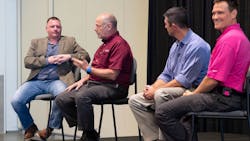FHExpo18: Expert Panel Discusses Health & Wellness
One of the hottest topics in the fire service today and a source of endless discussion among the many vendors and manufacturers participating at this week's Firehouse Expo in Nashville, TN, is health, wellness and fitness for modern firefighters.
With the greatest threats modern firefighters face no longer being simply those on the fireground but rather incidents involving cancer and cardiac events, MSA Safety brought together a panel of experts to speak on how firefighters can ensure they enjoy a long career and protect their health into retirement.
The panelists who volunteered their time to speak on these issues were:
- Ryan Pennington, a career firefighter and lieutenant/training instructor with the Charleston, WV, Fire Department.
- Rick Mason, a retired New Hampshire firefighter and the Training and Education Coordinator for the National Fallen Firefighters Foundation.
- Dr. Gavin Horn, the director of IFSI Research and a firefighter/engineer with the Savoy, IL, Fire Department.
- Aaron Zamzow, a firefighter/training officer with the Madison, WI, Fire Department and the founder of Fire Rescue Fitness.
The "Occupational Athlete"
The panel touched on the functionality of PPE and other gear playing a huge role in how firefighters can not only perform their tasks more efficiently but also put as little stress on their bodies as possible. The two concepts work in tandem with each other: Max efficiency in one will automatically benefit the other.
"There is sometimes a push between the people who are stressing health and those who are concerned with the operational needs of the fireground," Horn said. "Sometimes those two groups don't see eye to eye, but in many ways we're talking about the same thing."
With manufacturers continually evolving their designs, the panelists stressed that firefighters should keep up to date on all the latest innovations to find the kit that works best for their positions and the tasks they are assigned.
"We want to make sure that we're not quite as restrictive as far as the way we stand, the way we crawl, the way we squat and the way we lift," Pennington said, adding that he's noticed a recent trend where firefighters are moving toward Total Heat Loss (THL) in their protective gear as opposed to Thermal Protective Performance (TPP) in order to gain greater mobility.
Zamzow's expertise in the realm of fitness touched on how exercise remains key to helping firefighters perform efficiently, but they shouldn't forget how important a healthy diet is to the job. It's important to know what you put into your body and also when to intake in order to reach peak performance.
A lot of research is being done while monitoring things such as heart rates and core temperatures during operations that will ultimately help firefighters understand the best dietary and exercise decisions they can make for their size, body types and fitness levels.
"What are we learning from research?" Zamzow asked. "And what are we doing with the data so that someone like me can understand it, and that's really a challenge. But from a standpoint of fitness and annual assessments, using this new technology is a great place to start learning."
One of the primary points when the panel touched on the topic of occupational cancer was the need for fire service leaders to begin changing the culture around firefighting. For example, the days of wearing soot on your skin as a badge of honor or not cleaning a helmet for long stretches to show you've been out there in the thick of things needs to become a thing of the past.
"What restricts people from (cleaning gear) sometimes is that it takes so long to put your gear back together," Zamzow said. "But I'm starting to see a lot of departments beginning to take steps to make properly cleaning your gear part of the culture."
Mason touched on how much the fire service has changed in these regards since he first got on the job back in the 1970s. The culture was different for him and his colleagues in those days, but he says he's continually impressed with the great strides firefighters have taken to begin addressing health and wellness issues that are entirely preventable with proper maintenance and decontamination.
"We didn't think about that stuff back in those days," Mason said. "I think the progress that has been made in the fire service in the last 40 years has been much faster than anyone truly realizes."
Horn's research with the Illinois Fire Service Institute (IFSI) is at the forefront of how firefighters can bring all of these elements—health, fitness and gear—together to perform their jobs better and maintain their physical and mental wellness for decades to come.
"Health is not replacing operational needs, or the aggressive work or the physical needs on the fireground that we need to have," Horn said. "But the healthier we are, the better we're going to be at the job."
About the Author

John Kosik
John was the managing editor of Firehouse after joining the Firehouse team in April 2017 after spending most of his career in journalism writing and editing sports and music content for the Associated Press in New York City. Transitioning into coverage of the fire service industry was a move close to his heart with several friends and family members serving in the FDNY. He lives in Chicago.
